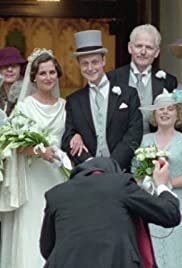
THE DOUBLE CLUE
UK, 1991, 50 minutes, Colour.
David Suchet, Hugh Fraser, Philip Jackson, Pauline Moran, Kika Markham, David Lyons, David Bamber, Charmian May, Nicholas Selby.
Directed by Andrew Piddington.
This is rather different story from those in Agatha Christie’s collection. There is no murder. The focus is on jewel thefts. It is a different revelation about Poirot himself, again played by David Suchet, again part of the television series of Agatha Christie mysteries.
This is a story of Poirot possibly in love – at least charmed and infatuated. The film opens with something of a joke, Hastings and Poirot driving through London, held up of lights, looking at a wedding group posed at the front of the church, and a discussion about marriage and Poirot’s reasons for not marrying.
Chief Inspector Japp is concerned, several jewel thefts, his not having any leads, pressures put on him by the authorities, his apprehensive must about losing his job. He consults Poirot.
There is a further theft, the audience being given some background of a rich man who deals in jewels and who is robbed, the young man who serves as an agent for private sales of jewellery and paintings for those who want anonymity. There is also an elderly rich woman who could possibly be the thief, being present in the house at the time of the theft.
But, the initial focus is on a Russian Countess, an emigre, arriving in London, in a lavish hotel, part of London society, present at the dinners where the jewel thefts took place. And she is present at the fourth.
Poirot meets her, is charmed, the audience seeing a somewhat different sensibility in Poirot. Japp is upset because Poirot is not investigating and there is continued pressure on him. Hastings and Miss Lemon and are intrigued. And, instead of investigating, Poirot accompanies the Countess for some days in touring the sights of London.
There are various possible thieves – but, the audience realises fairly soon, that the Countess is the thief. Poirot acknowledges this, but conceals the fact and she leaves, Poirot having enjoyed accompanying her, solving the case, wistful with his memories.
1. The popularity of Agatha Christie mysteries? The television series? David Suchet as Poirot?
2. A different kind of Poirot mystery? Jewel thefts? No murder?
3. The London settings, Poirot and his office, driving in the streets, dinners, the mansions, exteriors and interiors, the robbery sequences? Scotland Yard? The tours of London with Poirot and the Countess, the range of sights? The musical score?
4. Hastings, his participation in the investigation, his travels to Norfolk and the interviews? Miss Lemon and her work at home? Information? Chief Inspector Japp, his concern, consulting Poirot, the pressures from the authority, his fears for his job? Reliance on Poirot?
5. The atmosphere of jewellery, collectors, owners? Japp and the information about the previous robberies?
6. The dinner, those present, the visualising of the robbery, those going from the marquee into the house?
7. The introduction to the Countess, arrival in London, at the hotel, deference to her? Her presence at the various dinners where the robberies took place? Her being inside the house?
8. The humorous touch of the opening, Hastings and Poirot passing the wedding, Poirot’s explanation about not marrying? His first encounter with the Countess? Smitten in his own way? His deference to her, the discussions, his taking her out, the various sights of London, Japp and his being upset Poirot not investigating? The audience quickly suspecting the truth, the Countess and her background, impoverished, the need for money, Russian émigrés?
9. The background characters, the host of the dinner, his collection of jewels, the robberies? His being a mediator for deals done anonymously? Bernard Parker, his manner, con man, his deals, rich women? Paintings and initials?
10. The double clue, the glove, for a small hand, the cigarette case with the initials? A female hand? Russian letters?
11. The pressure on Japp, Hastings and Miss Lemon and their concern?
12. The farewell to the Countess, Poirot knowing what it happened, keeping her reputation? Her response to Poirot, charm, enjoying his company, saved?